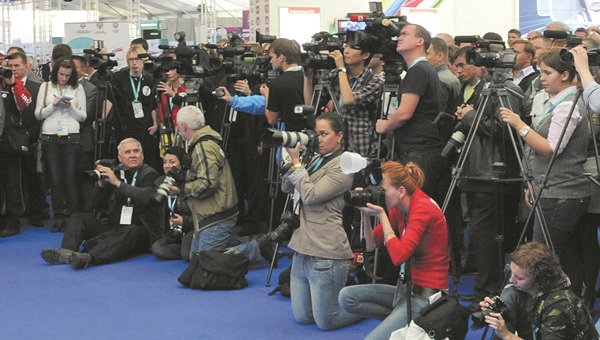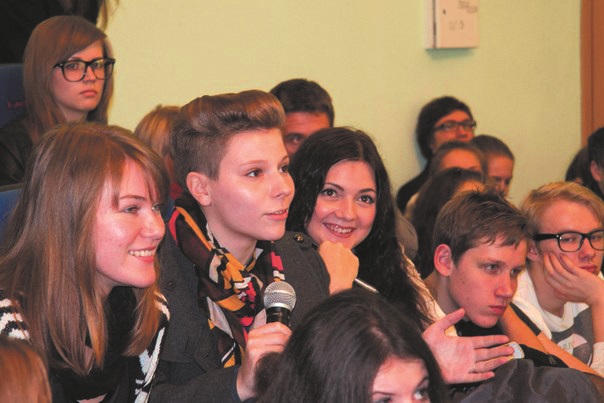
Journalism
|
42.03.02 Journalism |
|
|
|
Qualification: Bachelor’s Degree |
Journalist is a central figure in the modern information society. This profession gives the opportunity to influence on the mood of people, their attitudes to facts, events and phenomena of public life via creating journalist’s reports, interviews, informational, analytical and feature materials.

Newspaper, magazine, television, radio, the Internet are the platforms of journalist’s creative potential and talents realization in the XXI century. Technological progress requires that journalists should write intelligent, imaginative, logically created texts. The language of the modern Cinematography, Radio, Television, the Internet Mass Media originates from the language of a practicing journalist. Students learn to convey points of view through video, voice message, photo, Infographics not only to readers but viewers and listeners with the help of special disciplines of the curricula in the Journalism area of study.
Educational programs in the Journalism area of study in the SPbGUKiT are focused on graduates to acquire all the competencies needed for the future self-fulfillment in Mass Media of all types. Our graduates have universal personal, creative and technological potential to work in Mass Media area, and they are aware of social responsibility for their professional result. Journalism training courses in the University of Film and Television offers a unique opportunity to get acquainted with the world of Cinematography, Television and Culture. Many graduates become professionals in the fields like Informational, Analytical and Media coverage of the events of Russian and international cultural life.
What is Journalism itself - Art or Craft - is still a topical issue. There is no simple answer to this question as there is no fixed path in the Journalism profession. The Journalism has been evolving still. Mass Media means belong to mass communication as well as to personal communication, and Journalist can have monologue and dialogue with his audience.
For a journalists aimed at a long way in his Art (or career!) the main task is to be interesting to readers, viewers, followers in the blogosphere not only as a casual witness of the event but an author of original and unique style publications.
The creative path (or career) is not only the process of climbing the ladder in editorial sphere. It is also a movement for creativity, fulfillment of personal potential in covering new areas of life while using new formats, new genres and new media.
An average man’s happiness is to avoid living in the time of changes, but for a journalist to live and work in the time of changes (this is the modern time...) is an excellent opportunity for personal fulfillment, professional growth and creativity.

Curriculum Disciplines for 42.03.02 Journalism
Humanitarian, Social and Economic Disciplines
Basic Subjects: Philosophy, History, Study of Culture, Foreign language; Psychology, Political Science, Jurisprudence, Economy, Sociology.
Optional Subjects: the Art of Cinematography and Television; Second Foreign Language; Russian History in Mass Media; Rhetoric; Copyright and Related Rights.
Electives: Mass Culture and Mass Communication; History and Culture of Saint-Petersburg; Myth-making and Religion; Information Law.
Natural Sciences Disciplines
Basic Subjects: Concepts of Modern Natural Science, Modern Information Technologies.
Optional Subjects: Computer Graphics.
Electives: Audience Measurement ; Information Systems in Archiving.
Specialization Disciplines
Basic Subjects: Professional Basics; Basis of Journalism Theory; Basis of Communication Theory; Basis of Literature Theory, History of Russian Literature; History of Foreign Literature; History of Russian Journalism, History of Foreign Journalism; the Mass Media System; Basis of Journalistic Activity; Logics; Modern Russian (and Native) Language, Stylistics and Literary Editing; Professional Creative Studios; Issuing of Educational Mass Media; Applied Disciplines (Photography, Computer Design); Mass Media Equipment and Technology; Basis of Advertising and Public Relations in Mass Media; Sociology of Journalism; Legal basis of Journalism; Professional Ethics; Economics and Management of Mass Media; Psychology of Journalism.
Optional Subjects: Linguistics; Social Journalism, Media Criticism; Work in Convergent Edition; Television in Mass Media; Information Journalism; Theory and Practice of Audiovisual Programs Editing; Analytics and Journalism in Mass Media; Internet Journalism; Broadcasting in Mass Media; Photo Journalism.
Electives: Radio and Television Elocution; Travel-Journalism; News Journalism; Interview Technology; Business Journalism; Corporate Mass Media; Journalistic Investigation; Basis of TV and Radio Presenter’s Craftsmanship.


 Search
Search